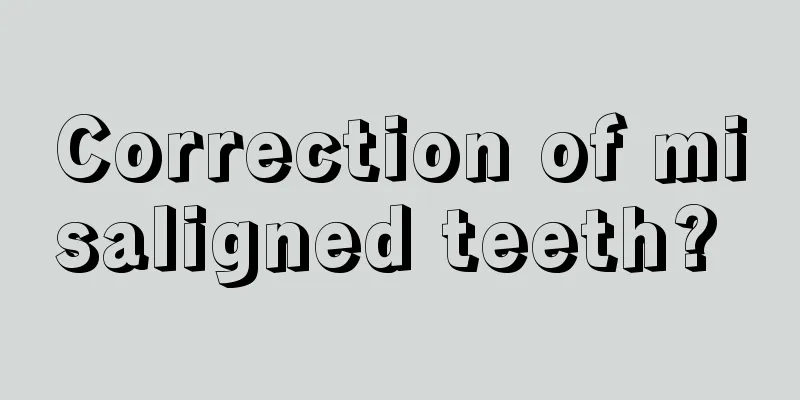Correction of misaligned teeth?

|
Many people don’t know much about orthodontics and simply think that orthodontics means wearing braces. In fact, orthodontics is not only about aligning the teeth, but also about whether you can have a perfect smile line after the teeth are aligned. If the teeth are not aligned, you must get correction as soon as possible to avoid affecting the health of the oral cavity and causing oral diseases. Why is full mouth correction necessary for orthodontics? First, we need to understand the purpose of orthodontics. Orthodontics is not just about aligning teeth, but also about considering whether you can have a perfect "smile line" after the teeth are aligned. Therefore, the orthodontist needs to design the curvature of the smile line according to the patient's facial features. The most important point is to ensure that every tooth works normally in its own position and ensure normal occlusion function. Even if only the upper teeth are crooked, full mouth correction is required. If you only correct the crooked teeth, it is easy for the upper and lower teeth to be misaligned, which will lead to correction failure. If we insist on "half-mouth correction", it is very likely to destroy the original occlusion relationship of the teeth. Over time, the uncoordinated collision between the teeth will cause tooth cracks, occlusal trauma, decreased chewing function, and even temporomandibular joint disorder and other problems. Of course, it is not completely impossible to correct half of your teeth. Few people can achieve the requirements of half-mouth correction. Unless it is a very simple situation, a minor adjustment of the bite will suffice. Otherwise, it will cause a disordered bite which will be difficult to correct and you will have to undergo full mouth correction again in the future, which is really not worth it. Is it possible to do half-mouth orthodontics? Since the degree of dental deformity varies from person to person, many people have great doubts about whether orthodontic treatment can only correct half of the mouth. From the perspective of professional orthodontic treatment, only doing half-mouth orthodontics can easily cause problems with the bite of the upper and lower teeth, thus leading to correction failure. For example, if only the upper jaw is worked on and not the lower jaw, after the upper jaw is aligned, the dental arch has formed a relatively stable oval shape, but the lower jaw is still crowded and uneven, with a completely irregular upper and lower bite, and the vertical and horizontal bite relationships may not be very good. Such a functional bite will definitely not be able to bite naturally and well. If the alignment of teeth is not harmonious, the occlusal relationship will definitely not be stable and the future occlusal function will not be very good. Over time, it will cause bite interference, possible mandibular joint pain, and unstable tooth arrangement. As time goes by, the teeth will gradually become crooked again. Generally, you should not do single-jaw correction unless the situation is really very simple and a slight adjustment of the bite will be enough. Otherwise, it will cause bite disorder and it will be difficult to correct. In the future, you will have to undergo full-mouth correction again, which is really not worth the loss. Some doctors accommodate patients, which is an irresponsible practice and will ultimately harm the patients. Of course, we cannot deny it completely. Usually half-mouth correction has very strict requirements on the degree of dental deformity. For example, the alignment of the upper and lower bites is very important, that is, the cusp and fossa alignment. That is, the state of the upper and lower teeth biting two is necessary, and the cusp and fossa can bite together stably. In this way, chewing food can perform its normal function, the chewing efficiency will be high, and the digestive function will be smooth. What are the dangers of correcting only a single row of teeth? 1. Affects the chewing function of teeth If only the upper jaw is worked on and not the lower jaw, all teeth involved in the correction of the upper jaw will move to a certain extent after alignment, while the uncorrected teeth in the lower jaw will not move, resulting in a change in the bite. When only partial correction is done, the occlusion relationship between the upper and lower jaws cannot be corrected artificially, so the occlusion will be worse after the correction, which will affect the most basic function of the teeth - chewing, and thus affect the digestive mechanism. 2. Loose and falling teeth Teeth are prone to occlusal trauma, causing them to become loose and fall out 3. Cause facial soft tissue problems An imbalanced bite can cause problems with the facial soft tissues, such as muscle problems, facial stiffness, and decreased facial softness. 4. Cause oral diseases Occlusal imbalance can lead to periodontal disease, pain in the temporomandibular joint area, and even unexplained headaches and wedge-shaped defects in most posterior teeth. 5. Unstable and prone to relapse An imbalanced bite can lead to an unstable tooth alignment. Over time, the dentition will gradually relapse and become irregular again. Orthodontists generally do not recommend correcting a single row of teeth, unless the situation is really very simple and a slight adjustment of the bite will be enough. Otherwise, once a disordered bite occurs, it will be very difficult to correct it, and at that time you will have to undergo full mouth correction again, which is really not worth it! |
<<: What are the dangers of orthodontic treatment at the age of 40?
>>: What are the symptoms of chronic appendicitis?
Recommend
What are the symptoms of early and late stage lung cancer
Lung cancer is a disease name used in both Chines...
How long will insomnia last after quitting smoking?
Many people suffer from insomnia after quitting s...
What are the early symptoms of bone cancer
In recent years, bone cancer has become one of th...
Can people with high blood pressure eat chicken soup?
Hypertension is a very serious disease. Suffering...
What details should be paid attention to when a glioma occurs
Some people may experience headaches, vomiting, a...
How to make hair fluffy when it is close to the scalp
Nowadays girls are more concerned about the probl...
High school students' schedule
There are many high school students in our lives....
How to maintain red sandalwood bracelets
Nowadays, in addition to wearing gold, silver and...
Explain the main causes of breast cancer for everyone
Any disease has certain causes, and breast cancer...
What should patients with colorectal cancer pay more attention to in daily life?
What should patients with colorectal cancer pay m...
What are the effects and functions of jasmine hydrosol?
I believe everyone knows jasmine, which is a very...
Large intestine reflexology area body part
You may have heard that each of people's fing...
Young people should pay special attention to avoid misdiagnosis of gastric cancer
Gastric cancer can occur at any age, and in recen...
What kind of tea is good for excessive phlegm
Many people like to drink tea, especially those w...
What are the early symptoms of liver palms
The early symptoms of liver disease include the a...









